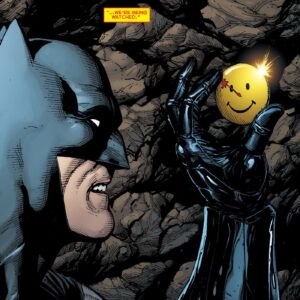Freedom and Justice in Watchmen
By Nehir Tutkun Yaka

Watchmen is a graphic novel by Alan Moore and Dave Gibbons that takes place in an alternate 1985 where superheroes are part of everyday life and the world is on the brink of nuclear war. A group of retired superheroes known as the Watchmen are drawn back into action when one of their own is murdered, and they uncover a larger conspiracy that could destroy the world. The story explores themes of power, morality, and the limits of democracy, as the Watchmen confront their own flaws and the harsh realities of a world on the brink of destruction. Watchmen is praised for its complex characters and innovative storytelling.
The central conflict in “Watchmen” arises from the superhero Dr. Manhattan’s decision to withdraw from society and allow the United States to win the Vietnam War. This leads to a global shift in the balance of power, from which the United States emerges as the world’s dominant superpower. The characters in the novel, including the retired superheroes known as Watchmen, respond to this shift in different ways, illustrating the complex relationship between power and democracy. Ozymandias is portrayed as a brilliant but morally ambiguous character who wants to save the world by any means necessary. Being a former superhero and a successful businessman, he is convinced that his superior intellect and resources give him the right to take matters into his own hands, without regard for democracy or human rights.
He believes that the end justifies the means and that his actions will ultimately lead to a more peaceful and prosperous world. However, Ozymandias’s plan raises serious ethical and moral questions about the nature of power and the limits of democracy. By taking matters into his own hands and making decisions without consulting the public or other stakeholders, he undermines the principles of democratic governance and human rights. Rorschach’s idea of justice and democracy is complex and rooted in his personal moral code. He sees the world in a way where it is either black or white in which there is no room for compromise or shades of grey. For Rorschach, justice is absolute, and he believes that everyone should be held accountable for their actions, no matter who they are. However, Rorschach has a somewhat limited view of democracy. He has little faith in the system of government and believes that those in power are corrupt and self-serving. He sees himself as a vigilante who is above the law and is willing to use violence to achieve his goals. While he believes in the idea of democracy, he is sceptical about its implementation in the real world and believes that justice can only be achieved through vigilante justice and personal responsibility. In Watchmen, Dr. Manhattan’s ideas about democracy and human rights are somewhat detached and scientific. He has outgrown humanity and sees things from a different perspective than most people. He believes that everything is predetermined and that free will is an illusion. However, Dr. Manhattan’s views are still influenced by his detached perspective, and sometimes he finds it difficult to understand human emotions and motivations. He sees the big picture and sometimes has difficulty connecting with the individuals who make up society. Nonetheless, his actions ultimately contribute to the preservation of democracy and human rights. Overall, “Watchmen” delves into the complexities of power, democracy, and human rights through its characters, inviting readers to reflect on the challenges and dilemmas that arise in their pursuit.
